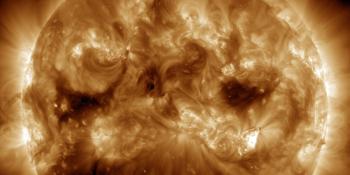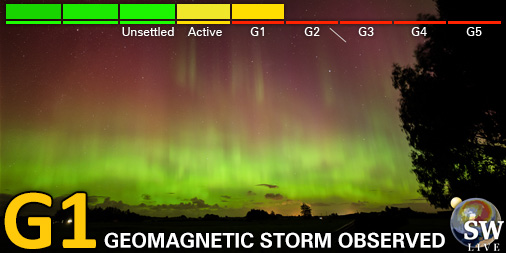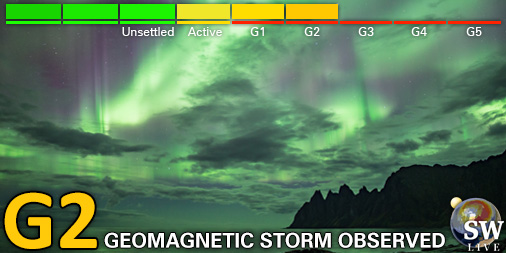Viewing archive of Tuesday, 11 September 2001
Solar activity report
Any mentioned solar flare in this report has a scaling factor applied by the Space Weather Prediction Center (SWPC). Because of the SWPC scaling factor, solar flares are reported as 42% smaller than for the science quality data. The scaling factor has been removed from our archived solar flare data to reflect the true physical units.
Report of Solar-Geophysical Activity 2001 Sep 11 2200 UTCPrepared by the NOAA © SWPC and processed by SpaceWeatherLive.com
Joint USAF/NOAA Report of Solar and Geophysical Activity
SDF Number 254 Issued at 2200Z on 11 Sep 2001IA. Analysis of Solar Active Regions and Activity from 10-2100Z to 11-2100Z
Solar activity has been moderate. Several M-class
flares occurred during the period. Available optical imagery
suggests that newly numbered Region 9616 (S12E80) rotating on to the
east limb was the source of the largest event (M4/Sf at 11/2036
UTC), as well as an earlier M1 flare at 0704 UTC. An M2 flare at
11/0111 UTC appears to have emerged from Region 9608 (S27W07),
which, along with Region 9610 (S14E08), also produced several lesser
C-class flares during the period.
IB. Solar Activity Forecast
Solar activity is expected to be at
moderate to high levels for the next three days. All regions
discussed in section 1A above appear to be potential sources for
isolated major flares.
IIA. Geophysical Activity Summary 10-2100Z to 11-2100Z
Geomagnetic activity was at quiet to active levels. Onset of high
speed stream effects appear to have developed from about 11/1200 UTC
through the end of the period.
IIB. Geophysical Activity Forecast
Geomagnetic activity is
expected to be at unsettled to active conditions for the first two
days of the forecast period. A combination of coronal hole high
speed stream effects, and the expected arrival of an interplanetary
shock from CME activity on 9 September, are anticipated to keep
geomagnetic activity elevated for the next two days. Isolated minor
storm conditions are possible at higher latitudes. Conditions are
expected to be quiet to unsettled by day three.
III. Event Probabilities 12 Sep to 14 Sep
| Class M | 80% | 80% | 80% |
| Class X | 15% | 15% | 15% |
| Proton | 10% | 10% | 10% |
| PCAF | yellow | ||
IV. Penticton 10.7 cm Flux
Observed 11 Sep 250 Predicted 12 Sep-14 Sep 245/235/235 90 Day Mean 11 Sep 163
V. Geomagnetic A Indices
Observed Afr/Ap 10 Sep 005/005 Estimated Afr/Ap 11 Sep 011/010 Predicted Afr/Ap 12 Sep-14 Sep 015/020-015/015-012/012
VI. Geomagnetic Activity Probabilities 12 Sep to 14 Sep
| A. Middle Latitudes | |||
|---|---|---|---|
| Active | 20% | 20% | 15% |
| Minor storm | 15% | 15% | 10% |
| Major-severe storm | 05% | 05% | 05% |
| B. High Latitudes | |||
|---|---|---|---|
| Active | 30% | 25% | 20% |
| Minor storm | 20% | 15% | 10% |
| Major-severe storm | 05% | 05% | 05% |
All times in UTC
Latest news
Latest forum messages
Incoming & Unnumbered Active Regions 1661Unspecified geomagnetic activity 2221AR4048 114New satellites - Proba-3, PUNCH, SWFO-L1, GOES-U/19 36Filaments and prominences 750
More topicsSupport SpaceWeatherLive.com!
A lot of people come to SpaceWeatherLive to follow the Sun's activity or if there is aurora to be seen, but with more traffic comes higher server costs. Consider a donation if you enjoy SpaceWeatherLive so we can keep the website online!

Latest alerts
10:00 UTC - Hemispheric Power Index
The OVATION model predicts the Hemispheric Power Index to reach 78GW at 10:32 UTC
04:15 UTC - Geomagnetic activity
Minor G1 geomagnetic storm (Kp5) Threshold Reached: 04:05 UTC
03:15 UTC - Geomagnetic activity
Moderate G2 geomagnetic storm (Kp6) Threshold Reached: 02:59 UTC
01:00 UTC - Geomagnetic activity
Minor G1 geomagnetic storm (Kp5) Threshold Reached: 00:51 UTC
Friday, 4 April 2025
23:30 UTC - Geomagnetic activity
Minor G1 geomagnetic storm (Kp5) Threshold Reached: 23:17 UTC
Space weather facts
| Last X-flare | 2025/03/28 | X1.1 |
| Last M-flare | 2025/04/01 | M2.5 |
| Last geomagnetic storm | 2025/04/04 | Kp5+ (G1) |
| Spotless days | |
|---|---|
| Last spotless day | 2022/06/08 |
| Monthly mean Sunspot Number | |
|---|---|
| March 2025 | 134.2 -20.4 |
| April 2025 | 148 +13.8 |
| Last 30 days | 130.9 -15.2 |






